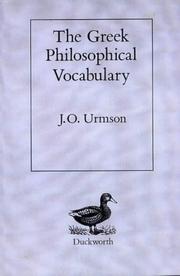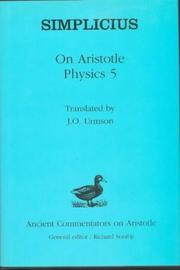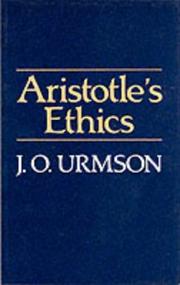| Listing 1 - 10 of 42 | << page >> |
Sort by
|
Book
ISBN: 0192875477 0192875469 9780192875471 9780192875464 Year: 1982 Publisher: Oxford Oxford university press
Abstract | Keywords | Export | Availability | Bookmark
 Loading...
Loading...Choose an application
- Reference Manager
- EndNote
- RefWorks (Direct export to RefWorks)
Berkeley, George --- Berkeley, George, --- G. B. --- B., G. --- Berkley, George, --- Author of The minute philosopher, --- Minute philosopher, Author of the, --- Cloyne, --- Berkeley, --- Member of the established church, --- בערקלי, דזשארדזש, --- Author of Siris, --- Berkeley, George, - 1685-1753
Book
ISBN: 0091228506 Year: 1975 Publisher: London Hutchinson
Abstract | Keywords | Export | Availability | Bookmark
 Loading...
Loading...Choose an application
- Reference Manager
- EndNote
- RefWorks (Direct export to RefWorks)
Philosophy --- -#GROL:SEMI-101<03> --- Mental philosophy --- Humanities --- Dictionaries --- Dictionaries. --- #GROL:SEMI-101<03>

ISBN: 0715623354 9780715623350 Year: 1990 Publisher: London Duckworth
Abstract | Keywords | Export | Availability | Bookmark
 Loading...
Loading...Choose an application
- Reference Manager
- EndNote
- RefWorks (Direct export to RefWorks)
Greek language --- Philosophy, Ancient --- English --- Etymology --- Dictionaries --- Greek. --- -Classical Greek language --- Ancient philosophy --- Greek philosophy --- Philosophy, Greek --- Philosophy, Roman --- Roman philosophy --- Dictionaries&delete& --- Greek --- Classical Greek language --- Philosophy --- -Philosophy, Ancient --- -Greek language --- -English --- -Greek --- -Dictionaries --- Grec (Langue) --- Philosophie ancienne --- Dictionaries. --- English. --- Etymologie --- Dictionnaires --- Dictionnaires anglais --- Greek language - English - Dictionaries --- Philosophy, Ancient - Greek - Dictionaries --- Greek language - Dictionaries - Etymology

ISBN: 9780715627655 0715627651 1472558464 9781472558466 Year: 2013 Publisher: London : Bloomsbury,
Abstract | Keywords | Export | Availability | Bookmark
 Loading...
Loading...Choose an application
- Reference Manager
- EndNote
- RefWorks (Direct export to RefWorks)
Simplicius, the greatest surviving ancient authority on Aristotle's Physics, lived in the sixth century A.D. He produced detailed commentaries on several of Aristotle's works. Those on the Physics, which alone come to over 1,300 pages in the original Greek, preserve a centuries-old tradition of ancient scholarship on Aristotle. In Physics Book 5 Aristotle lays down some of the principles of his dynamics and theory of change. What does not count as a change: change of relation? the flux of time? There is no change of change, yet acceleration is recognised. Aristotle defines 'continuous', 'contact', and 'next', and uses these definitions in discussing when we can claim that the same change or event is still going on. Simplicius, the greatest surviving ancient authority on Aristotle's Physics, lived in the sixth century A.D. He produced detailed commentaries on several of Aristotle's works. Those on the Physics, which alone come to over 1,300 pages in the original Greek, preserve a centuries-old tradition of ancient scholarship on Aristotle. In Physics Book 5 Aristotle lays down some of the principles of his dynamics and theory of change. What does not count as a change: change of relation? the flux of time? There is no change of change, yet acceleration is recognised. Aristotle defines 'continuous', 'contact', and 'next', and uses these definitions in discussing when we can claim that the same change or event is still going on. This volume is complemented by David Konstan's translation of Simplicius' commentary on Physics Book 6, which has already appeared in this series. It is Book 6 that gives spatial application to the terms defined in Book 5, and uses them to mount a celebrated attack on atomism. Simplicius' commentaries enrich our understanding of the Physics and of its interpretation in the ancient world.
Aristote, --- Aristotle. Physics. Book 5. --- Change -- Early works to 1800. --- Science, Ancient Continuity -- Early works to 1800. --- Physics --- Science, Ancient. --- Aristotle. --- Physica (Aristoteles). --- Aristoteles, --- Aristote
Book
ISBN: 0090874315 Year: 1971 Publisher: London Hutchinson
Abstract | Keywords | Export | Availability | Bookmark
 Loading...
Loading...Choose an application
- Reference Manager
- EndNote
- RefWorks (Direct export to RefWorks)
General ethics --- Stevenson, Charles L. --- Emotivism. --- Stevenson, Charles Leslie, --- Ethics. --- Semantics (Philosophy). --- Ethics --- Semantics (Philosophy) --- Morale --- Sémantique (Philosophie)
Book
ISBN: 0090874307 9780090874309 Year: 1968 Publisher: London Hutchinson university library
Abstract | Keywords | Export | Availability | Bookmark
 Loading...
Loading...Choose an application
- Reference Manager
- EndNote
- RefWorks (Direct export to RefWorks)

ISBN: 0631159460 0631156739 9780631159469 Year: 1988 Publisher: Oxford
Abstract | Keywords | Export | Availability | Bookmark
 Loading...
Loading...Choose an application
- Reference Manager
- EndNote
- RefWorks (Direct export to RefWorks)
1 <38> ARISTOTELES --- 1 <38> ARISTOTELES Griekse filosofie--ARISTOTELES --- Griekse filosofie--ARISTOTELES --- General ethics --- Aristotle --- Ethics --- Morale --- Aristotle. --- Ethics. --- Contributions in ethics --- Aristotle - Contributions in ethics. --- Aristotle. Nicomachean ethics.
Book
ISBN: 0715624342 9780715624340 9781780934242 1780934246 9781780934259 1780934254 1472552342 Year: 1993 Publisher: London Duckworth
Abstract | Keywords | Export | Availability | Bookmark
 Loading...
Loading...Choose an application
- Reference Manager
- EndNote
- RefWorks (Direct export to RefWorks)
"This companion to J. O. Urmson's translation in the same series of Simplicius' Corollaries on Place and Time contains Simplicius' commentary on the chapters on place and time in Aristotle's Physics book 4. It is a rich source for the preceding 800 years' discussion of Aristotle's views. Simplicius records attacks on Aristotle's claim that time requires change, or consciousness. He reports a rebuttal of the Pythagorean theory that history will repeat itself exactly. He evaluates Aristotle's treatment of Zeno's paradox concerning place. Throughout he elucidates the structure and meaning of Aristotle's arguement, and all the more clearly for having separated off his own views into the Corollaries."--Bloomsbury Publishing This companion to J. O. Urmson's translation in the same series of Simplicius' Corollaries on Place and Time contains Simplicius' commentary on the chapters on place and time in Aristotle's Physics book 4. It is a rich source for the preceding 800 years' discussion of Aristotle's views. Simplicius records attacks on Aristotle's claim that time requires change, or consciousness. He reports a rebuttal of the Pythagorean theory that history will repeat itself exactly. He evaluates Aristotle's treatment of Zeno's paradox concerning place. Throughout he elucidates the structure and meaning of Aristotle's argument, and all the more clearly for having separated off his own views into the Corollaries.
Lieu (Philosophie). --- Place (philosophy) - Early works to 1800. --- Temps (Philosophie). --- Aristote / Physique - Livre 4, ch. 1-5, 10-14. --- Aristotle / Physics. --- Physics --- Science, Ancient. --- Aristotle. --- Philosophy of nature --- Aristotle --- Place (Philosophy) --- Time --- Early works to 1800. --- Aristoteles. --- Hours (Time) --- Geodetic astronomy --- Nautical astronomy --- Horology --- Philosophy --- Place (Philosophy) - Early works to 1800. --- Time - Early works to 1800.
Book
ISBN: 0198811535 Year: 1969 Publisher: London Oxford University Press
Abstract | Keywords | Export | Availability | Bookmark
 Loading...
Loading...Choose an application
- Reference Manager
- EndNote
- RefWorks (Direct export to RefWorks)
Book
Year: 1966 Publisher: London Clarendon
Abstract | Keywords | Export | Availability | Bookmark
 Loading...
Loading...Choose an application
- Reference Manager
- EndNote
- RefWorks (Direct export to RefWorks)
| Listing 1 - 10 of 42 | << page >> |
Sort by
|

 Search
Search Feedback
Feedback About UniCat
About UniCat  Help
Help News
News